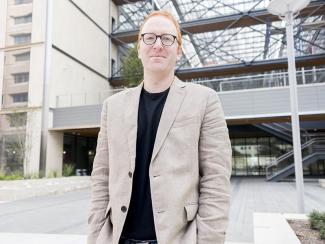
Daniel Wasserman, professor in the Chandra Family Department of Electrical and Computer Engineering, received one of 13 grants awarded to proposals for the Advanced Component Technology Program (ACT-22), a technology development program managed by the Earth Science Technology Office (ESTO).
With these selections, ESTO is pioneering the next generation of highly innovative technologies for Earth science remote sensing. The ACT-22 solicitation called for disruptive technology with particular focus on photonic integrated circuits (PICs), quantum remote sensing, and metamaterials.
Abstracts for the 13 awards have a total dollar value of approximately $15.5M over three years.
Wasserman's project is titled "Ultra-compact Machine-Learning-driven platform for room temperature mid-wave infrared remote sensing."
The program is a collaboration with scientists at UMass Lowell (led by Prof. Viktor Podolskiy), and aims to develop new classes of mid wave infrared (MWIR, 3-5 microns) sensors for Earth Science applications. Specifically, the team will look to enhance the sensitivity and increase the operating temperature of MWIR detectors, and then to develop a novel detector architecture, as well as imaging modality, leveraging integrated ‘metasurfaces’, nanoscale patterns designed to deterministically couple incident light to MWIR focal plane arrays (FPAs).
The team aims to advance the ability to detect and image in the MWIR, which is a spectral range of significant importance for Earth Science applications such as monitoring of surface temperatures, atmospheric scattering, and vegetation cover. Because modern high-performance MWIR sensors typically require significant cooling for efficient operation, the ability to operate such detectors without cryogenic cooling would have immediate impact on the field of remote sensing, significantly decreasing the size, weight, power, and cost of airborne/space-based remote-sensing. The proposed program will benefit data collection for weather forecasting models and the understanding (and mitigation) of climate change. In the longer-term, the metasensor approach proposed by the UT/UMass team offers a potentially transformational advance to MWIR imaging. Metasensing will enable multi-modal information collection, drastically reduce the size and complexity of the imager by integrating detectors and machine learning (ML) designed front optics within the same static chip, and simultaneously move the tasks related to focusing, aberration correction, etc. from imaging time to software (ML-based) post-processing, thereby enabling future mining of existing data with extra sensing modalities or improved algorithms.
The proposed effort will leverage the team’s combined expertise in theory, numerical techniques, machine-learning, optical and electronic design, epitaxial growth, nano-fabrication, and optical and electronic characterization. Graduate students at UT Austin supported on the program will work closely with their peers at UMass on the design, growth, fabrication, and characterization/testing of the sensors. The program will look to deliver high-performance detectors and proof-of-principle metasensor FPAs operating at high temperatures, allowing the platform to simultaneously analyze multiple aspects (frequency, direction, polarization) of incident light with proper software post-processing. Ultimately, the program will look to demonstrate sensor suitability for vital Earth Science applications.
Dr. Dan Wasserman is a Professor and holds the Cullen Trust for Higher Education Endowed Professorship in Engineering #3 in the Chandra Family Department of Electrical & Computer Engineering at The University of Texas at Austin.
Dr. Wasserman received his Sc.B. in 1998 from Brown University in Engineering/Physics and History, graduating Phi Beta Kappa, Magna Cum Laude, Sigma Xi, and with Honors. Dr. Wasserman received his PhD from the Department of Electrical Engineering at Princeton University in 2004. At Princeton, Dr. Wasserman was a Francis Upton Fellow and a National Science Foundation Graduate Fellow. Dr. Wasserman’s post-doc, as a Princeton University Council on Science and Technology Fellow, focused on quantum cascade laser physics in the Gmachl group at Princeton University. In 2007 Dr. Wasserman joined the Physics faculty at UMass Lowell and then moved to the University of Illinois Urbana Champaign in 2011, where was promoted to Associate Professor with tenure in 2015. Prof. Wasserman will join the University of Texas ECE department in the Fall of 2016. Dr. Wasserman is the recipient of the NSF CAREER award, an AFOSR Young Investigator Award, the 2010 Excellence in Teaching Award from the UMass Lowell Physics Department, and the 2015 Distinguished Promotion Award from the University of Illinois Urbana Champaign.
